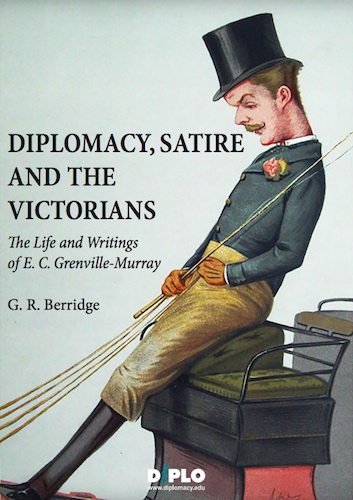Diplomacy, Satire and the Victorians: The Life and Writings of E. C. Grenville-Murray
Second edition (digital), revised 2018
E. C. Grenville-Murray was a diplomat-journalist whose widely admired craftsmanship with the pen made him a legend in the press in the second half of the nineteenth century. His savage and inventive satires on British diplomacy also gave impetus to the mid-Victorian movement for diplomatic reform. But since then he has been almost completely forgotten. This is partly because he made too many powerful enemies, with the result that his name was blackened and he was forced into permanent French exile; and partly because he wrote either pseudonymously or anonymously. This book, which rests on extensive use of private papers, official documents, press archives and not least Grenville-Murray’s vast output (including novels), is the first biography of this complex man to be written. It begins with the difficulties produced by his illegitimate birth, and then describes his patronage by Lord Palmerston and Charles Dickens, his colourful diplomatic career, and finally his blossoming as a successful writer in France in the 1870s. See also here.
It was first published on this website in 2013 and, also on this site, in a new edition in 2015. In 2017 the second edition was published by The Isis Press, Istanbul, and in 2018 – after further minor revision – placed on the ISSUU platform by DiploFoundation under the new title. It is in many ways my favourite book. Dip into The Queens’ Messenger here, which he produced singlehandedly as his revenge on the Foreign Office for sacking him, and you’ll begin to see why.
Addenda
- Individuals who worked simultaneously as diplomats and journalists (p. 2): Petr Botkin, the late nineteenth/early twentieth century Russian diplomat, provides another example of a member of the career who simultaneously wrote anonymously for the press. Scribbling for Novoye Vremya, he also resembled Grenville-Murray to the extent that his articles were critical of his foreign ministry employers (Marina Soroka, The Summer Capitals of Europe, 1814-1919, p. 109).
- George Stevens, family deaths (p. 73): his sons both died at Kherson, the first on 2 March 1862 and the second on 19 July 1866, while his wife died on 1 May 1868 at Odessa. (I am grateful to Tony Nicholson for this information, gleaned from death notices in the Illustrated London Newsand the London Evening Standard.). As to the end of his career, I say at p. 80fn 2 that he ‘eventually ended up in Brazil.’ To elaborate: still with the same rank (consul), he was appointed for the Brazilian provinces of Bahia and Sergipe – residing at the former – on 16 April 1881 (FO List 1890) and died at this post on 13 December 1890 (FO List 1903).
Comments on the First edition
‘I can’t disembark at Southampton at the crack of dawn on Tuesday without telling you first what a boon companion your Grenville-Murray on my Kindle has been throughout the voyage and during rare moments of reading time in New York and Boston. My enjoyment has been wonderfully enriched by the amazing parallels with another Murray – Craig, of course … You tell the G-M tale brilliantly and it cries out to be made into a film. What a lively society it was then! Your account puts the Oscar Wilde affair nicely into perspective’ (Brian Barder, QM2, 3 November, 2014). Since then, Brian has been kind enough to post a blog about the book. [24/11/2014]
‘Congratulations on your study of Murray. I’ve only just discovered him myself and I am so pleased there is a biography…. I’m reading the online version and enjoying it hugely. This superbly researched work is a model of the kind of study that is so badly needed to help provide the larger picture. There is too much writing on the well-known’ (Richard Grenville Clark, Apocalypse Press). [22/11/2014]
‘What an astonishing story: I sat up till half-past midnight last night finishing it. It is rare to find such a fund of real research contained in such a readable envelope’ (Robin Fairlie, sometime company managing director, marketing consultant, and author; now historian and collector of English verse epitaphs) [28/11/2014].
‘[T]hank you for the book. I greatly enjoyed reading it and revisiting the East in the 1850s and 1860s’ (Dr Laurence Guymer, Head of the Department of History, Winchester College, and Research Associate in the School of History, University of East Anglia; author of Curing the Sick Man: Sir Henry Bulwer and the Ottoman Empire, 1858-1865 (Republic of Letters, 2011) [29/1/2016].
‘ … wonderful piece on Grenville-Murray’ (Tony Nicholson)



